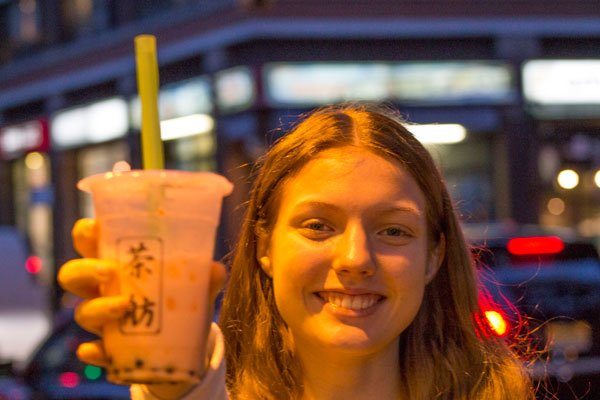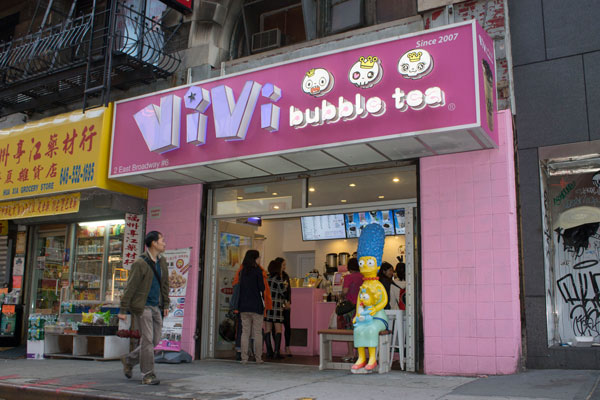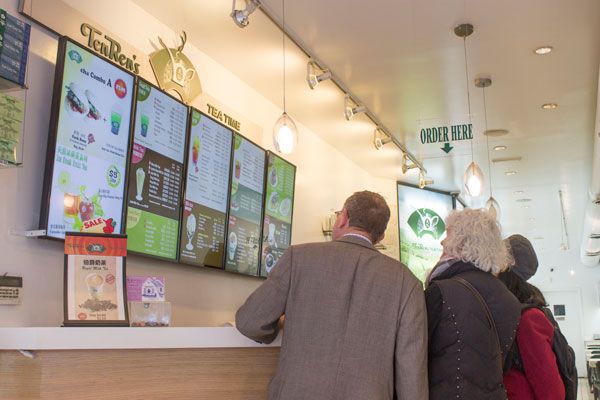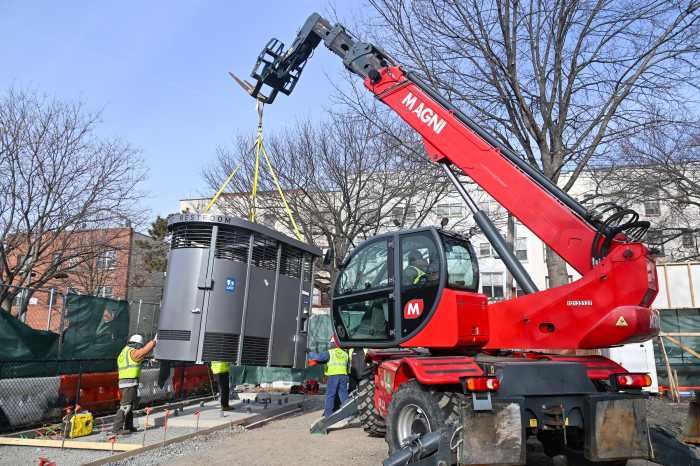
Renata Anorsdottir with a cup of bubble tea.
BY ZACH WILLIAMS | Anne Pappenheim of Oxfordshire, England came to Chinatown for a different kind of tea Monday afternoon.
She took it with milk, sugar and plenty of black tapioca balls at the bottom of her domed plastic cup. She had never drunk bubble tea before this week, but a classmate from her university days would change that by bringing her to Ten Ren’s Tea Time on Mott St.
“I’ve been told it’s an experience not to be missed,” she said as she turned her attention to the matter at hand.
“That’s lovely,” she said of the cold, vanilla-flavored drink in her right hand.
Call it tapioca milk tea, bubble milk tea, boba (pronounced “ball [without the L sound] bah”) or zhenzhu naicha (“jen jew nigh cha”) . Within the last 30 years, the drink has spread from its native Taiwan to Chinese communities throughout the world. A dozen or so businesses devoted to it are within a few minutes walk from Columbus Park in Manhattan’s Chinatown. While their products taste quite similar, businesses distinguish themselves through ambience and the pace of life patrons desire as they satisfy their sweet teeth.
Wellington Chen, executive director of the Chinatown Partnership, a local business group, said boba business is hot. The phenomenon represents the broader Chinese snack tradition that often relies on the innovative use of ingredients and a cultural fixation on eating, he said. A common Chinese vernacular greeting includes a question: have you have eaten?
Acquiring the necessary permits to sell bubble tea is relatively easy compared to other business types, Chen added.
“They do recognize one thing,” he said about Chinatown business owners. “Bubble tea has a nice profit margin to it.”
Innovation accompanies the increasingly competitive local tapioca milk tea market, he said.
“We didn’t used to see this variety,” he said in a phone interview. “That is new.”

“The Simpsons” statue adds some American flavor to the scene outside Vivi Bubble Tea on E. Broadway.
Some businesses offer long lists of available flavors. Others tempt passersby with accompanying snacks. There are places to drink boba and relax whereas other joints offer no place to sit. A sculpture of Marge and Maggie Simpson meanwhile attract attention to Vivi Bubble Tea at 2 East Broadway where the interior and menu options alike resemble snack shacks in China itself. There is the popcorn chicken — something that added two pounds to my frame in Xi’an, China eight years ago.
The gleaming counters and steel sidings at Vivi juxtapose with the grimy sidewalk. This place would be quite at home near any Beijing university campus.
Tapioca milk tea appeals to the younger folks for two reasons, according to Vivi employee Bai Xun.
“There’s lots of flavors and it is cheap,” she said in Mandarin Chinese.
A cup usually goes for about $2 or $3.
Taro flavor did not disappoint me there as I completed a five-round binge of Chinatown’s zhenzhu naicha. While Vivi offers salty deep-fried confections, at Dragon Land bakery on the corner of Baxter and Walker Sts., the mixtures of sugar and salt come within the pastries. French chef Armelle Giriot has come there for the food as well as ample seating for 25 years. However, she had never tasted bubble tea until a friendly reporter offered her a sip last Friday afternoon.
She was under the initial impression that blueberries were at the bottom of the drink.
“Not bad,” she said, but it was a bit too sweet for her taste.
Fay Da Bakery on 83 Mott St. keeps the sugar to a minimum. Ovaltine is on the menu but their real specialty was speed. Within 30 seconds, ordering and preparation were completed. Efficiency and technological sophistication coalesce at Kung Fu Tea on 234 Canal St. where 21st-century Chinese culture reveals new culinary heights amidst pop music ballads.
There were lots of people and racket inside the shop on Oct. 3. The customer queue moved swiftly through as one machine shook the orders while another applied tops with a seemingly never-ending ease. Shop employees rushed to fill orders. Half the clientele occupied themselves with smart phones as they waited. They evidently had little time to lose as they retrieved their drinks and re-entered the N.Y.C. bustle outside.
When Donza Knight came to New York City a few years ago there weren’t so many places in Manhattan selling bubble tea, though she first tried it in her native Buffalo.
“Then all of a sudden, they were everywhere,” she said.
Not so much though in Iceland, said Renata Anorsdottir who is currently studying classic ballet in the U.S. A classmate’s mother brought her to Chatime at 240 Canal St. for her second taste of cultural diffusion.

She did not go for a classic flavor though, preferring a bit of the familiar instead. Imbibing chewy tapioca through an oversized straw might just be peculiar enough.
“The texture of the bubbles is really strange and fun,” she said.
The Chinatown Partnership’s Chen said the strange ingredients found in Chinese snacks can be attributed in part to a tumultuous history. Famines and wars made his ancestors consider foods as well as combinations that people elsewhere in the world might have overlooked, he said.
“We care a lot about eating,” he said. “We haven’t always had it easy.”
Now Chinese people enjoy foods as diverse as scorpions, duck intestines and green pea ice cream in the booming night markets of China, Taiwan and Singapore. Nostalgia for these markets runs strong in Chen’s office, he said. With bubble tea there is a fun outlet for this and a “win-win” for local businesses and their customers, he said.
“They are perfecting these little goodies,” he said of Asian night market snacks gaining increasing prominence stateside. “They are absolutely yummy.”
A sample of Bubble Tea places
Dragon Land Bakery
135 Walker St.
Open everyday 7 a.m. – 8 p.m.
Fay Da Bakery
83 Mott St.
Everyday 7 a.m. – 8:30 p.m.
Kung Fu Tea,
234 Canal St.
Tues.-Sun. 11 a.m. – 10:30 p.m., Mon. 11 a.m. – 9:30 p.m.
Teariffic Café
51 Mott St.
Everyday 11 a.m. – 11:30 p.m.
Ten Ren’s Tea Time
79 Mott St.
Sun.-Thurs. 10 a.m. – 8:20 p.m.,
|Fri.-Sat. 10 a.m. – 9 p.m.
Vivi Bubble Tea
2 East Broadway
Mon.-Thurs. 10 a.m. to 10 p.m.,
Fri.-Sat. 10 a.m. – 11 p.m.






























